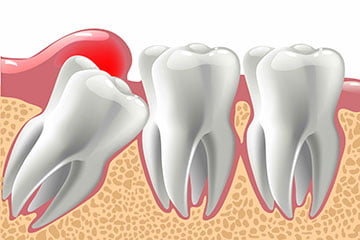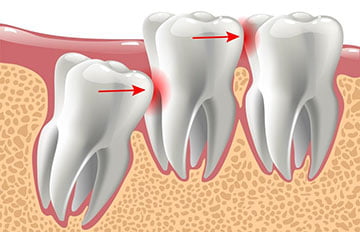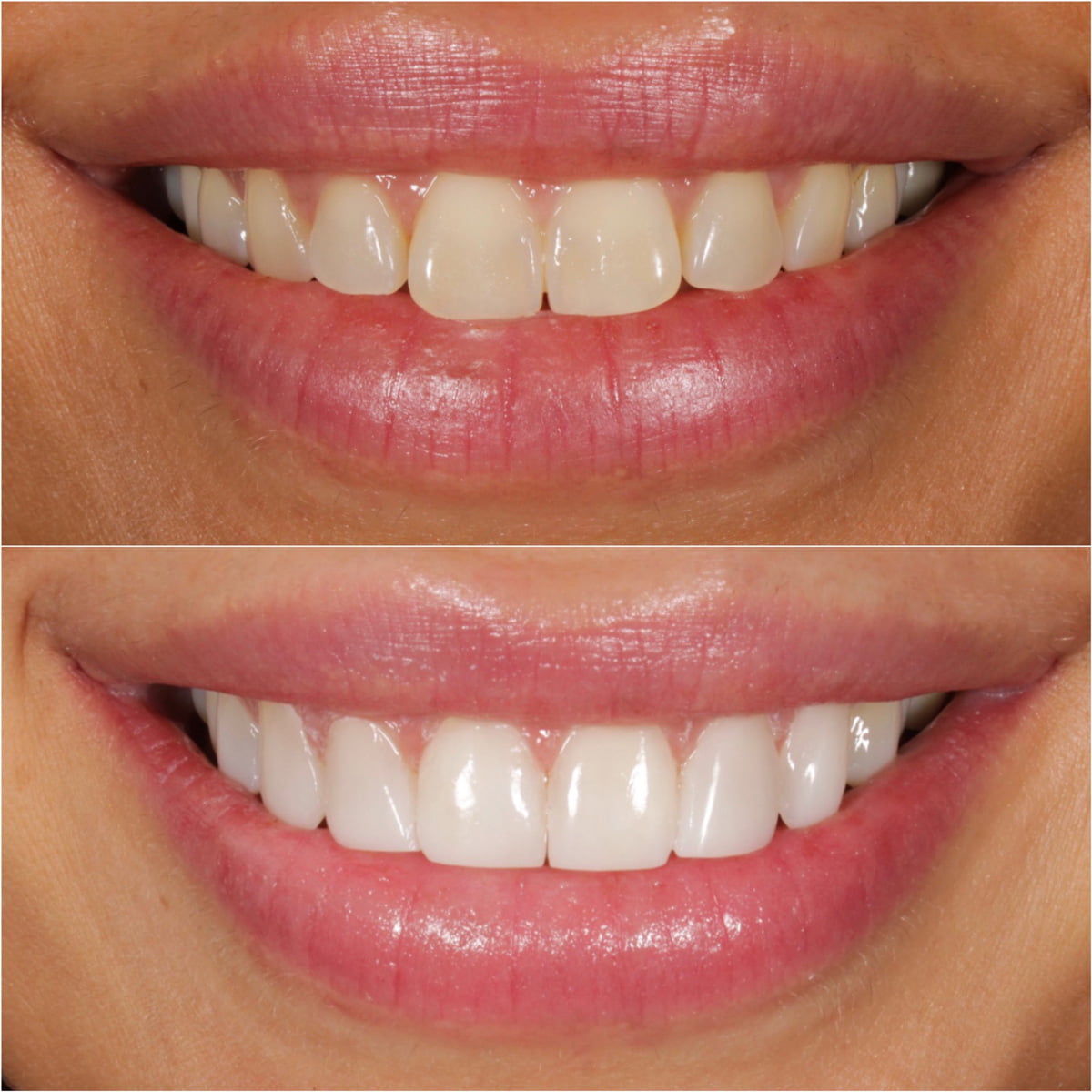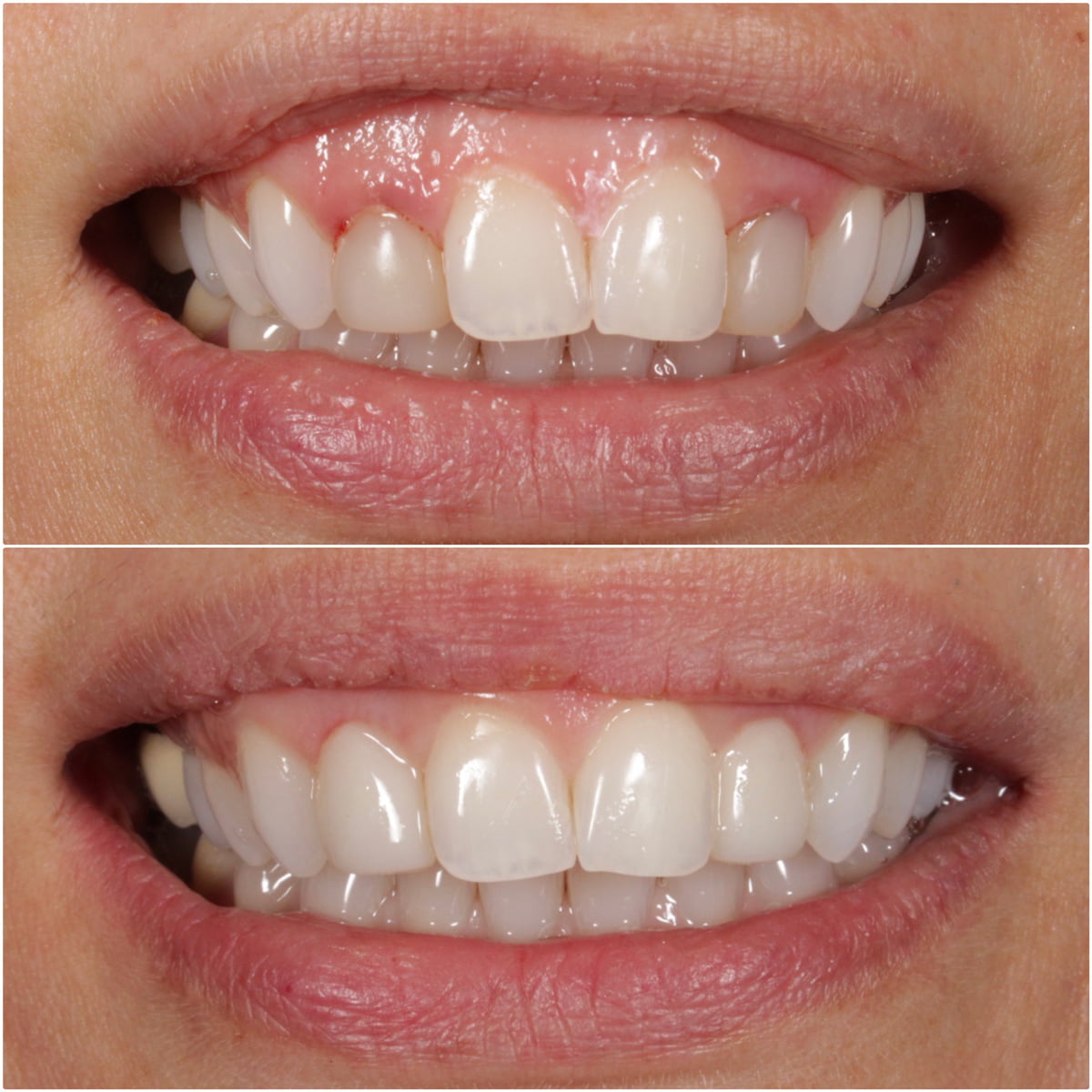Wisdom Teeth Removal in Mississauga
What is wisdom teeth removal?

Wisdom teeth removal, also known as wisdom tooth extraction, is a standard dental procedure to address issues related to the final set of molars that typically emerge in late adolescence or early adulthood.
These molars, known as wisdom teeth, often lack sufficient space in the jaw to erupt correctly, leading to complications such as impaction, crowding, or misalignment. To alleviate discomfort and prevent potential oral health problems, dentists recommend the removal of wisdom teeth.
The procedure involves carefully extracting one or more wisdom teeth, usually performed under local or general anesthesia. Wisdom teeth removal is a proactive measure to maintain overall oral health and prevent potential complications associated with the late eruption of these molars.
Problems with wisdom teeth?

When the wisdom teeth grow properly and well-aligned, they can function just as well as your other molars and can be a valuable addition to your mouth. However, having them misaligned and even impacted is more often, requiring an extraction.
Every year, tens of millions of wisdom teeth are being removed all around the world, so if you currently suspect yourself of experiencing pain or discomfort caused by wisdom tooth (or teeth) growth, you are definitely not alone.
Why is wisdom teeth surgery necessary?

Wisdom teeth surgery is deemed necessary when these third molars, which typically emerge in the late teens or early twenties, pose a risk of complications. The main issues arise from factors such as inadequate space in the jaw or improper alignment, leading to impacted wisdom teeth. This condition can result in pain, swelling, and potential damage to adjacent teeth. The surgery involves extracting problematic wisdom teeth to alleviate discomfort and prevent further dental problems. Oral surgeons perform this routine procedure to ensure the patient's overall oral health. While not everyone requires wisdom tooth operation, those with issues related to the emergence or positioning of these molars can benefit significantly from the intervention, avoiding potential pain and complications in the future.

The wisdom teeth removal process
The wisdom teeth removal process, known as third molar extraction, involves several key steps.
Initial Assessment:
The process begins with a comprehensive examination, often involving X-rays, to evaluate the positioning and condition of the wisdom teeth.
Decision for Extraction:
Based on the assessment, the dentist or oral surgeon decides whether the wisdom teeth must be removed to prevent complications.
Anesthesia Administration:
Before the surgery, the patient is administered local anesthesia to numb the specific area or general anesthesia for complete sedation, ensuring a pain-free procedure.
Incision and Access:
A small incision is made in the gum tissue to access the impacted wisdom teeth. Removing a portion of the bone covering the tooth may be necessary in some cases.
Tooth Extraction:
Surgical tooth extraction is done using specialized tools. If a tooth is impacted or challenging to remove, it may be divided into smaller sections for easier extraction.
Stitching and Gauze Placement:
The surgical sites are stitched once the teeth are removed to promote healing. Gauze is placed over the extraction sites to control bleeding and aid in clot formation.
Wisdom tooth extraction recovery:
The patient receives detailed after-extraction care instructions, including guidelines for rest, ice application to reduce swelling, and pain medications for managing discomfort.
We are happy to provide professional treatment assistance.

Our bodies are biologically programmed to grow 32 teeth in total, however, for one reason or another, the modern human’s jaw only has enough space to fit 28 teeth. While there can be other causes of toothache and oral health issues related to wisdom teeth growth, this issue of lack of space is the most common cause.
Due to this lack of room, a wisdom tooth might grow at an angle to the back of the mouth, or pushing the adjacent tooth. In turn, this condition can lead to gum inflammation, decay and severe infections, among others.
What to Expect after Wisdom Tooth Extraction
Following the extraction of a wisdom tooth, patients can anticipate several postoperative manifestations, necessitating attentive care and adherence to prescribed guidelines.
Immediate Aftermath
Hemostasis: Occasional, minor bleeding is expected post-extraction. Applying gentle pressure on the extraction site using a sterile gauze pad is recommended for the initial hours to achieve hemostasis.
Pain and Edema
Edema: Edema is a typical sequel, typically reaching its zenith approximately 48 hours post-procedure.
Analgesia: Discomfort is inherent; analgesic management, either through prescribed medications or over-the-counter options, is advisable.
Oral Care
Non-disruption: Caution should be exercised to avoid disturbing the surgical site, refraining from undue manipulation with the tongue or manual interference.
Mouth Rinse: Adherence to the stipulated schedule for oral rinsing, incorporating a gentle saline solution, is imperative. Vigorous rinsing is contraindicated within the initial 24 hours.
Postoperative Monitoring and Compliance
Adherence to Instructions: Strict adherence to postoperative directives issued by the healthcare provider is paramount.
Scheduled Follow-ups: Attendance at scheduled follow-up appointments is essential to evaluate healing progress and address any emerging concerns.
Complications and Communication
Prompt Consultation: In the event of persistent or intensified bleeding, severe pain, or indications of infection such as fever or progressive swelling, immediate consultation with the healthcare provider is imperative.
This comprehensive approach ensures an informed and reasonable postoperative course, fostering optimal recovery and mitigating potential complications.
Frequently Asked Questions
Wisdom teeth typically erupt in late teens to early adulthood—around 17 to 25 years of age. This is where they get the name “wisdom”, because most people get these teeth when they finally reach adulthood.
However, there’s no set rule about when wisdom teeth should erupt. Some people might get them in their late 20s or early teenage years. Some might not get any wisdom teeth at all during their lives, some might only grow one or two, and some others might have all four erupt at the same time.
The exact cause of these abnormalities in wisdom teeth’s growth is still the topic of ongoing debates. Some might say our smaller jaws is a proof of human evolution, some others will say it’s just a genetic mutation.
The fact remains, however, that up to 85% of the total population experienced wisdom tooth-related problems and in need of extractions. It is well accepted today that wisdom teeth is no longer a necessary part of our mouths, but a relic of the past.
As mentioned, there are cases when wisdom teeth can grow perfectly without any health and functional issues, mainly when the said person has a larger jaw to accommodate the wisdom teeth. However, since various studies have suggested that human’s jaws are indeed getting smaller, this doesn't happen to a lot of people.
Many experts agree that this is mainly caused by the changes in our diet. In modern times, we eat significantly “easier”, processed foods than our ancestors.
We require far less effort to chew and bite our foods, and so our jaws have adapted to become smaller over the generations. This condition, ultimately caused the lack of space for the final set of molars to grow into, leading to various issues and complications.
Below are some of the common problems related to wisdom teeth growth:
- Incomplete growth: the wisdom tooth’s crown is unable to fully erupt through the gum, sometimes causing a wounded area on the gums to left open. This open wound will be more exposed to bacterial buildup, inflammation,and infection.
- Impaction: the wisdom tooth is said to be “impacted” when it grows at an angle, pushing the tooth beside it, or when it’s angled to the back of the mouth. When the tooth is impacted, it is more prone to inflammation and infection, and can cause severe pain. In severe cases, the adjacent tooth might be severely misaligned due to the pressure.
- Recurring gum issues: even when the wisdom teeth has grown properly without any visible issue, there are cases of recurring pain that keep resurfacing for years in the future. Usually, the culprit is gums that are not properly healed or misaligned after the tooth’s reuption, opening up an exposed area that is prone to infection.
- Gum Inflammation/Pericoronitis: the gum tissue surrounding the wisdom tooth can be inflamed, mainly when there’s an incomplete eruption. In severe cases, pericoronitis can develop into cysts and even tumors. Wisdom tooth extraction can reduce pressure on surrounding tissue and promote healing on the inflammation/infection.
- Infection: the wisdom teeth’s positions at the very back, will also mean they are harder to clean, and so are more prone to bacterial buildup and ultimately, infections. During incomplete or impacted growth, spaces created between the growing wisdom tooth and the adjacent one can collect food debris, and develop tartar and plaque.
The wisdom tooth must be extracted in two conditions:
- When the tooth is already infected, causing pain and discomfort, and no treatment alternatives are possible.
- When the wisdom tooth might risk potential complications in the future—even when it doesn't cause any pain at the moment.
Contact our office and schedule your appointment with our professional dentists to discuss your treatment options, and whether an extraction is necessary after considering future risks.
Impaction of the wisdom teeth happens when the tooth is growing at an angle—and in severe cases, completely sideways. When the wisdom tooth is impacted, it is a major reason to consider an extraction.
Impacted wisdom tooth, as well as incomplete or misaligned eruption, will significantly the risks of inflammation, infection, and decay. This condition will also affect the surrounding gum tissue and adjacent teeth.
While an impaction might not cause any immediate issue, it can lead to mild to moderate pain, and ultimately, severe complications.
An impacted wisdom tooth can have the following symptoms:
- Metallic taste in the mouth, or other unpleasant tastes
- Inflamed, tender and swollen gums
- Foul odor coming from the tooth and the surrounding area
- Difficulty, often painful biting and chewing
- Pain and discomfort when closing and opening mouth
As previously mentioned, the main cause of impacted wisdom teeth is a lack of space, so the tooth can’t grow properly. In most humans today, there is only enough space for 28 teeth instead of 32.
The wisdom teeth—as the final adult teeth to erupt—, are programmed to push through the gums and find space to grow, even if it means growing in the wrong direction to push the nearby tooth. This is what caused the sideway growth.
The smaller and narrower jaws of modern people have caused the wisdom teeth to grow at an angle or even sideways. When the crown of the wisdom tooth pushed against the neary tooth, it will create a condition we call “impaction”. Here, the wisdom tooth is pushing in long-term against the surrounding gum tissue, the second molar, and even the jawbone. This can cause tooth decay, pain, discomfort, malocclusion, teeth misalignments, and infection.
We can diagnose the existence of an impacted wisdom tooth by weighing the possible symptoms above. Yet, the most accurate way is to take an x-ray imaging.
There are many patients suffering from problems related to wisdom teeth growth, but not ready for an extraction.
It’s important, however, to understand that the risks for potential complications and health issues might develop further as we age, and won’t heal itself with time.
Make your appointment with our professional dentists here at Skymark Smile Centre to discuss possible options for treatment if you decide not to extract the wisdom tooth. Our team will inform all the necessary things you should know, especially how you must take care of the tooth in order to prevent further complications.
If you decide not to pull out the problematic wisdom tooth—or teeth—, extra cleaning and care for the tooth must be maintained at all times. This is to prevent risks of decay and infection.
When the wisdom tooth is already impacted, leaving it for too long might push the adjacent tooth and surrounding tissue, causing misalignment and overcrowding. Extraction is usually the preferred solution in these cases.
Impacted teeth can cause various issues from cosmetic and aesthetics (i.e. crooked teeth), but can also cause functional issues like weakening and misaligning your bite, as well as increased risks for inflammation and infection. Malocclusion (misalignment) might also block some areas of your teeth from common oral cleaning methods, which will risk bacterial buildups.
Another consideration is that if we choose not to extract the wisdom tooth and it ended up causing malocclusion, future treatments to repair alignments will be very expensive compared to extraction. Not to mention, the restorative treatment will also require extraction of the wisdom tooth.
Although wisdom tooth extraction can be quite painful and expensive, our professional dentists at Skymark Smile Centre can help providing affordable and effective extraction to avoid painful processes. We will provide all the important information to help you prepare ahead of the procedure and also to prepare for better recovery processes.
The stigma surrounding the wisdom tooth procedure is that it’s extremely painful, and so this is the most frequently-asked question by patients with wisdom-teeth issues.
To answer this, we have to first clear out several issues.
First, there are at least two different types of wisdom teeth extractions:
- When the wisdom tooth is fully erupted
- When the wisdom tooth only partially erupted, or is completely hidden under the gum
For the former, the extraction procedure won’t require surgery to open up your gum, and will be similar to a normal extraction procedure.
For the latter case, a surgical incision must be made on the gum tissue before we can extract the wisdom tooth underneath. This will be a minor surgical procedure.
For both types of procedures, local anesthesia will be applied so the patient shouldn’t feel any pain during the procedure, only minor pressure and discomfort. You will feel mild pain during the injection (typically novocaine or similar anesthetics). With new inventions in dental technologies, anesthesia application is now very painless.
If necessary, sedatives might be prescribed to help with anxious patients, to make the more comfortable and relaxed during the procedure.
Here at Skymark Smile Centre, our dental specialists are experienced in handling dental anxiety, and are always committed in providing the best possible treatment during any procedure. For a wisdom tooth removal, preparation for the procedure, ensuring ideal dose of anesthetics, and catering to the patient’s references are our main concerns to ensure successful treatment and recovery period.
In most occasions, a wisdom tooth extraction procedure is mostly painless. However, we should expect minor to moderate pain and discomfort as as soon as the anesthetics wear off.
During the first few days after the procedure, we should expect the peak of the painful sensation and swelling. After that, the pain, discomfort, and swelling should heal gradually, and should disappear completely in no more than two weeks.
The dentist may apply stitches to help close the wound on the gum tissue when a surgical procedure was involved in the extraction process. You will need to return to the dentist in around a week’s time to remove the stitches.
Typically, the dentist will prescribe over-the-counter pain medication to help manage the pain during this recovery time. If necessary, stronger painkillers may be given, depending on the patient.
You might want to adjust your diet during this recovery period to softer foods and avoid overly cold or hot drinks. This is done to manage the pain and discomfort, help with the healing process, and avoid further damage to the gum tissue.
Here at Skymark Smile Centre, we understood that the recovery period of wisdom tooth extraction is just as—if not even more important— than the procedure itself. Our dentist will keep in touch until you have completely recovered from the procedure, providing important information, and will always be on the ready when you experience any prolonged pain or potential complications. Our mission is to ensure a speedy and successful recovery period for all our patients.
Unfortunately, yes. Although it’s very rare with the modern dental technologies and procedures, there is still a possibility that the patient experience poor healing and recovery.
Poor care and hygiene during the recovery period is the main cause of improper healing. It’s advised to closely follow the dentist’s instructions for the recovery period and pay close attention to your condition. Call your dentist when you feel you need a follow-up treatment or assistance in the case of complications.
Here are some symptoms to observe during the recovery period:
- Prolonged pain after more than a couple of weeks and unmanageable pain
- Sensitivity to hot and cold more than 3 days after the procedure
- Gum tenderness and inflammation
- Pus appearance, foul odor
- Numbness on your lips, chin, tongue, and around the area
- Fever and other signs of infection
- Bad breath
It’s important to note that these are not the only symptoms, but in general, if you still experience pain after two weeks, visit your dentist as soon as possible.
Here at Skymark Smile Centre, we understand the importance of your recovery period after the wisdom tooth extraction procedure. Ensuring a speedy recovery and prevent future complications are our topmost priority in assisting you throughout this period. Our team of professional dentists are experienced in wisdom tooth extraction over the years, and thoroughly understood the importance of assisting the recovery period.
One of the most common reasons for patients to go against a wisdom tooth extraction is financial issue. In fact, financial fears are the most common reason for dental anxiety in general.
While there’s no set rule for this, the typical cost of removing one wisdom tooth is between $120 to $950 on average. The deviation is quite wide, because the cost will depend on the complexity of the case and whether surgery is necessary. If you need to remove all four wisdom teeth, it can cost you around $450 to $4,000.
At Skymark Smile Centre, we are committed to provide a competitive, fair price for our procedures, including wisdom tooth extraction. Our main goal is to help you relieve the pain and discomfort, as well as to prevent further complications at an affordable cost.
We also offer various flexibilities to assist your financial needs, so you can choose the best possible payment method according to your financial situation.
Give us a call immediately, consult with our professional dental specialist, and find out the possible options and the associated costs according to your situation. Our main goal is to ensure you get the best possible deal according to your comfort.
You might stumble upon this guide because you currently suspect yourself or someone you know suffering from wisdom-teeth problems.
If you feel you are in need of a wisdom tooth treatment of extraction, you can contact us and schedule an appointment immediately. Our dental specialist can help diagnose your condition, find the best treatment alternative, and plan the right course of action together with you.
Here at Skymark Smile Centre, we employ the latest, professional dental equipment and state of the art facilities. Our team of professional dental specialists are working in a culture emphasizing customer service excellence above all else, with the goal of delivering the best possible treatment for the patients so we can achieve comfort, safety, and speedy healing process.
We took pride in our experience and we value the happiness of our patients after each successful treatment.
We can’t wait to be your partner in oral hygiene and healthcare, contact us immediately and find out how Skymark Smile Centre is the best possible option to help your wisdom teeth condition.


Smile Gallery
See what our patients are saying:
My wife got out two of her wisdom teeth today and Dr. David Sadeghi was very professional and perfect with his work.He did excellent job. It was a smooth 10 minutes procedure and Dr. David and his team was very helpful.One of the best dental clinics in Mississauga.
SkyMark Smile centre is a very good dental office, with a good team cooperation, very professional doctors and assistants, very enthusiasm manager and reception. They smile when I come there, I smile when I leave. This is a trusted place to go. I would like to recommend my families and my friends to come this dental office.
I've had really bad experiences with Dentists. My friend recommended them to me and they are the best of the best! Great staff, friendly, clean and very efficient in their work. They accommodate all necessary needs! Grateful to finally have dentists I can trust!
I wanted to express my thanks to Skymark Smile Centre. I have been a customer for many years and they are the most reliable, knowledgeable and have the most friendliest staff ! Equipped with the most up to date technology for a dentist office. 100% Recommend this office for your dental needs.
Excellent service. Staff are friendly and knowledgeable—doctor, hygienist and receptionist. The space was clean and I didn’t have to wait long for my scheduled appointment. Highly recommend them.
I definitely recommend skymark center, the staff is very friendly and have always welcomed me from the very beginning - Thanks to Marium and Alice❤️ My dentist Dr Goli and her assistants have been a tremendous help from the the very start. Dr Goli is very gently and very professional at her work.
Fantastic place! I went in for the first time, and I couldn't be happier with the way I was treated. Alice at the front desk is extremely friendly and really generous. She made sure that I went out with a smile on my face. Dr. Goli and Dr. Ishan were my dentist and dental assistant and they did a great job with cleaning my teeth. They were all extremely supportive and made me feel comfortable in a place where not many can be comfortable. They made me feel like there was still hope for my teeth and gave me great advice on how to keep them healthy and clean. Overall, this place is fantastic and the staff are super friendly and supportive. Come here if you want any kind of dental service!
Skymark has a convenient location with available parking. Alice is very friendly and attentive, Dr David and staff are most gentle and pay attention to patient’s comfort, and of course, health and well-being. I’m really happy that I switched to their dental office.
I had the most amazing experience at Skymark Smile Centre. Such a warm and welcoming office. From the moment you enter everyone from front desk onwards does their best to make you as comfortable as possible. Dr. Goli has such a gentle hand and I have been to my fair share of dentists but I’ve never had such a pain free injection as I did here. I highly recommend this office to anyone who is anxious about dental treatment like I am. Thank you Skymark team!
Wonderful experience! From Alice at front desk, the dental assistants Amy & Ishan, all the way up to Dr. Sadeghi; Skymark Smile Centre are welcoming and friendly. I’m looking forward to my continued bookings with them!